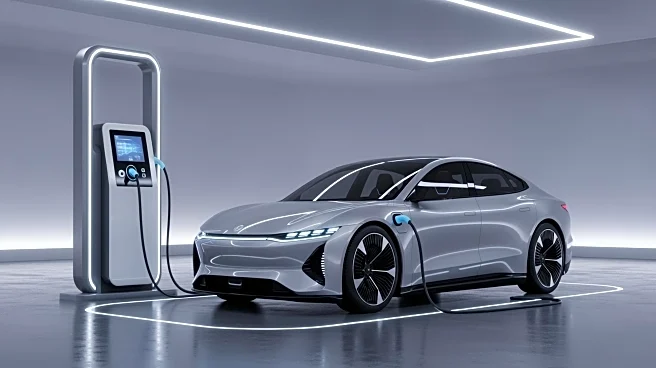What's Happening?
DS Automobiles has successfully demonstrated the long-range capability of its N°08 electric vehicle in a real-world road test. Two N°08 models completed a 750km journey from Vélizy to Biscarrosse on a single
charge, maintaining an average speed of 54km/h and achieving a consumption rate of 11.7kWh per 100km. This performance is below the homologated WLTP cycle figure of 12.9kWh per 100km, despite more demanding conditions. The test verified the model's claimed 500km motorway range, with the vehicles completing distances without charging across varied terrain and climate conditions. The N°08 features a 97.2kWh long-range battery and achieves a drag coefficient of 0.24.
Why It's Important?
The successful demonstration of the N°08's long-range capability is a significant advancement in electric vehicle technology, addressing consumer concerns about range anxiety. This development could accelerate the adoption of electric vehicles in the U.S., contributing to reduced carbon emissions and supporting environmental sustainability goals. The N°08's efficient energy consumption and extended range make it a competitive option in the growing EV market, potentially influencing industry standards and consumer expectations for electric vehicle performance.
What's Next?
DS Automobiles plans to continue testing the N°08 across various European countries to further validate its long-range capabilities. The company aims to leverage this performance to enhance its market position and expand its customer base. As the demand for electric vehicles increases, DS Automobiles may explore partnerships and collaborations to optimize battery technology and production processes, ensuring the N°08 remains competitive in the evolving automotive landscape.
Beyond the Headlines
The N°08's performance highlights the potential for advancements in battery technology to redefine electric vehicle capabilities. As manufacturers strive to improve energy density and efficiency, the automotive industry could see a shift towards more sustainable and environmentally friendly transportation solutions. This development also underscores the importance of infrastructure improvements, such as charging stations, to support the widespread adoption of electric vehicles.










